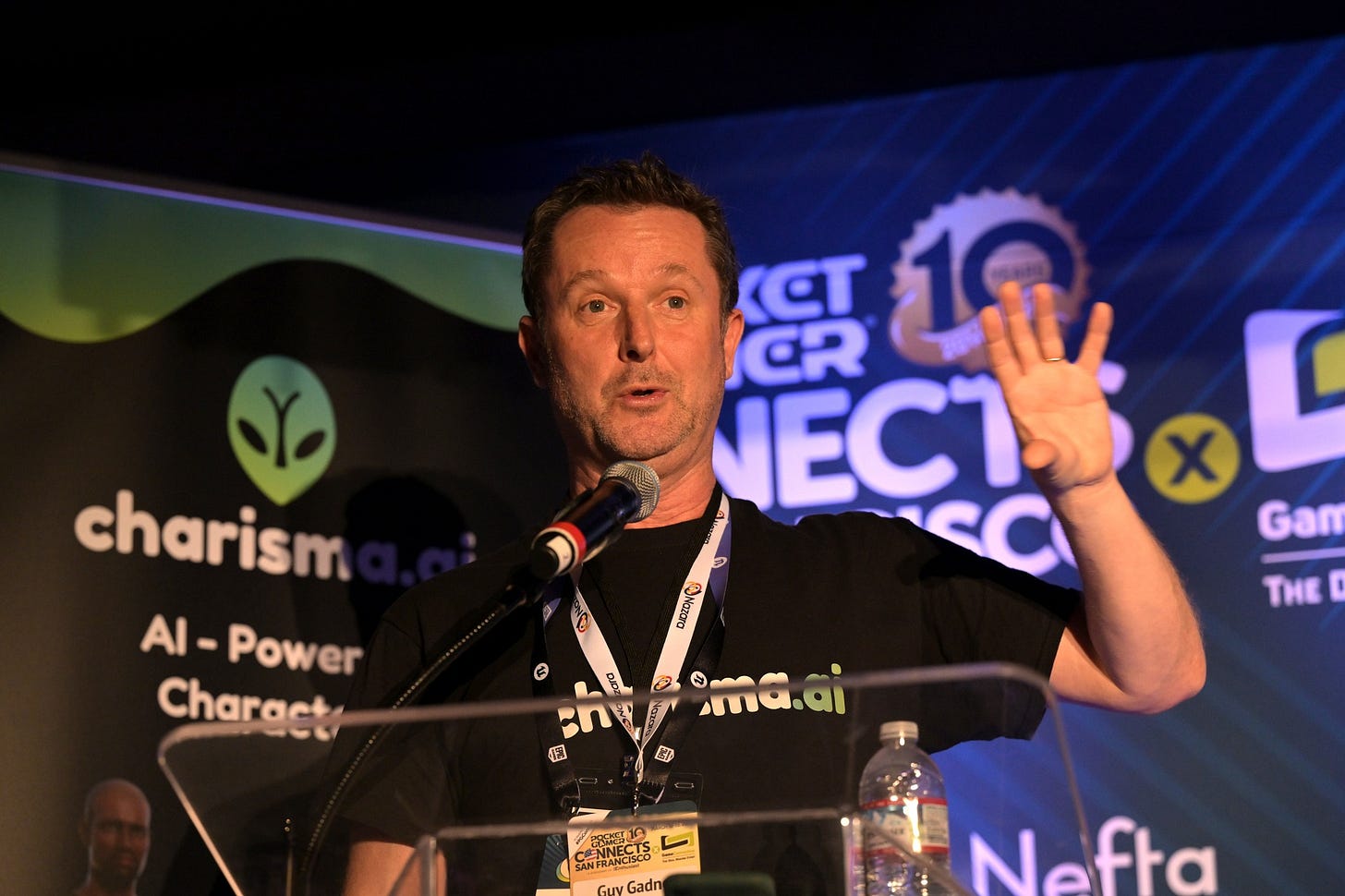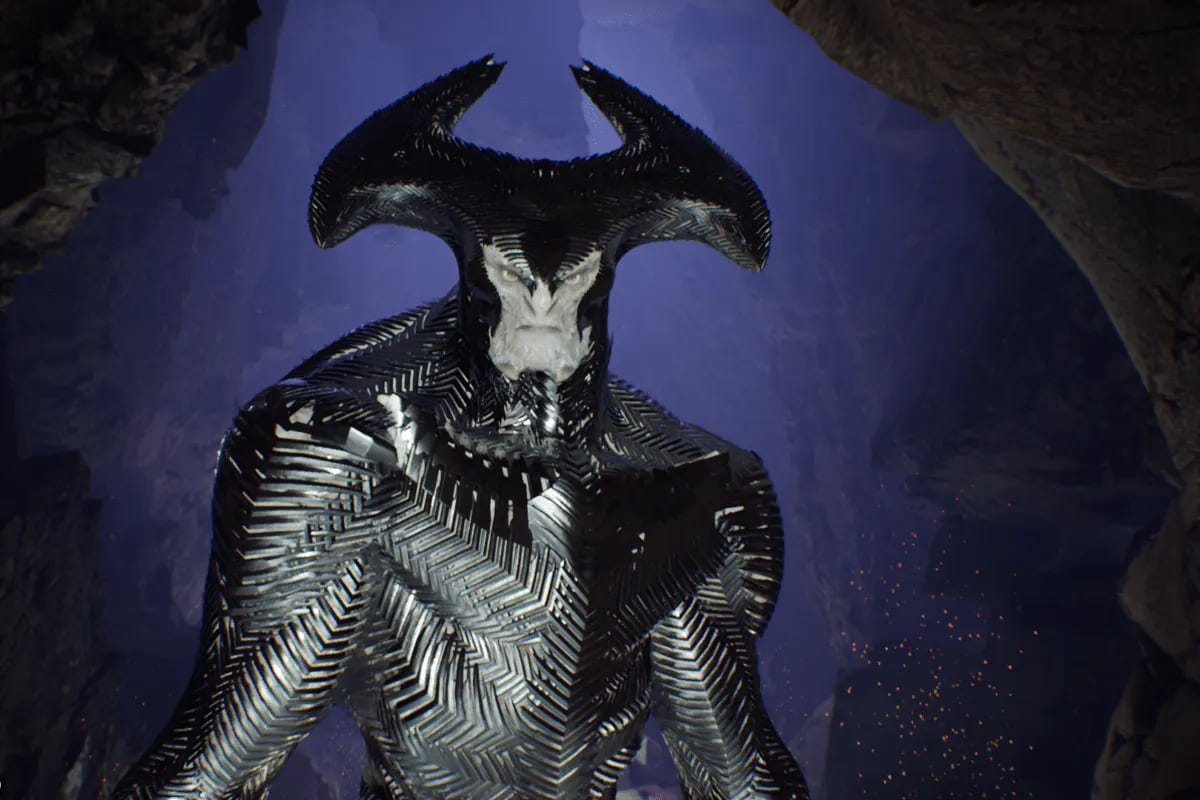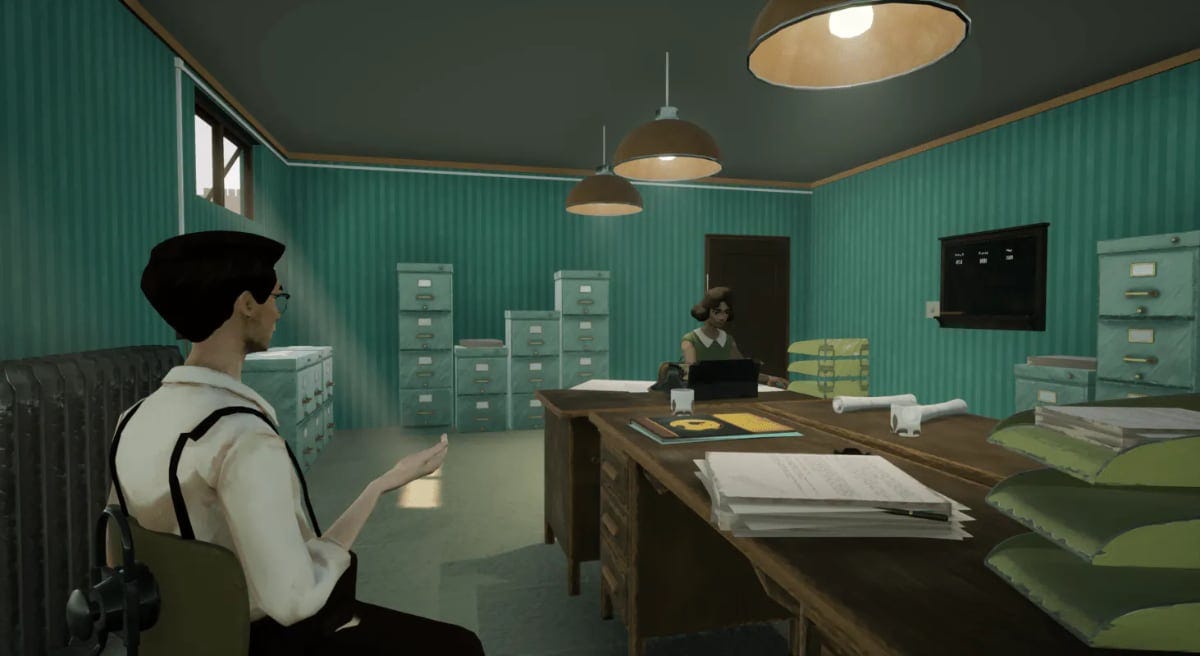"If we can power the next stage of the creator economy, that's a good thing"
Guy Gadney, CEO of Charisma.ai, talks ethics, the impact of AI on the wider entertainment sector, educating writers and more
Welcome to the first full edition of AI Gamechangers, a new newsletter where AI meets games. We’ll send you an interview with a leading industry figure each week, plus a few links to relevant news. Please forward this to your colleagues and encourage everyone to register for free. They won’t want to miss future editions (we have interviews with the bosses of Elevatix, modl.ai, Magicave, and more that are already scheduled).
In the meantime, scroll down for news on the EU’s AI Act, fine-tuning for GPT-4o, Nvidia’s NPCs in Mecha Break, the Best AI Games Tech category at the Mobile Games Awards 2024, and more.
Guy Gadney, Charisma.ai
For your first AI|G encounter, meet Guy Gadney, co-founder and CEO of Charisma.ai. Charisma.ai brings characters to life using AI, transforming interactive experiences into dynamic scenarios. Charisma.ai has worked on AI-powered marketing activations with Warner Bros, immersive theatre installations, and games like The Kraken Wakes. We discuss ethics, the relationship between AI and Hollywood, and more. Our conversation was lengthy for an email, and you’ll find a little more of this transcript on Charisma.ai’s blog.
Top takeaways in this interview:
AI should solve specific problems rather than being implemented just because it's trendy.
Automation is the outcome of AI, so study the effect of that.
Creative professionals need to actively engage with AI tools rather than dismiss them from a place of fear, because hands-on experience often transforms initial resistance into understanding.
Dynamic character interactions with NPCs are a promising AI use case.
Small, focused language models with guardrails may be more effective than large ones going forward.

AI Gamechangers: Video game voice actors and performance artists have called a strike, just as Hollywood actors did, over contract negotiations focused on AI-related protections. This is going to rumble on, isn’t it?
Guy Gadney: The thread that runs through this, and always has done, is ethics. It’s not just a beard-stroking, “nice to have” thing: ethics are quite fundamental to the way these technologies need to be designed.
When we were pitching Charisma, back in 2018, to a high-profile investor, we told him, “We're writing a paper on unconscious bias and AI datasets”. And he said, “That sounds like a distraction.” Needless to say, we didn't do any form of commercial agreement! For us, it is very important that the human is designed in from day one.
I've long quoted the line from Jurassic Park, “Scientists were so preoccupied with whether or not they could, they didn’t stop to think if they should.” I'm not surprised that unions and people around the creative industries are querying how these systems should be created.
We're starting to see the downturn of early AI companies that had huge VC backing back in 2022. My sense is that was unadulterated tech hype, fuelled out of the Bay Area. VCs falling for the hype. A number of those have gone very quiet. There are two reasons why. First, they didn't include the human in the mix! They came out of “big tech”, not out of the creative industries. So they were thinking in a very pure tech software way, rather than actually thinking about the end user, which is just the most insane way of designing a product. And secondly, which is linked to it, they didn't think about what benefit it was offering to games, or to storytelling, or to any process. They just did it, because they could. That breaks a rule of venture capitalism: what's the problem you're solving? And if you're creating a problem to then solve it, that’s a cardinal sin. So I'm not surprised game creatives are putting up resistance.
How can we better bring technologists and creatives together to work effectively and ethically in this space?
It is very important for all forms of the creative industries (including publishing, advertising, film, TV, games, everything), not to sit back and grumble but to actively engage with the various technologies that are out there so that an informed opinion can then be had. There is still an enormous amount of fear about AI. And to my mind, that fear is born out of a lack of understanding, a lack of education, about how these tools work.
We run workshops with writers and other creatives. And at the beginning of the day, somebody will say, “I'm never gonna touch it! I'd rather put a gun to my head than use AI.” But by the end of the day, they'll say, “Okay. It's not as existential as I thought.” We often put up a slide with AI code, as a spoiler alert, saying, “AI is not creative.” Of course it’s not, it's a machine.
As humans, we have an innate fear of the unknown. It goes back to our fear of the dark. However, it's important to know what is actually a risk and what is not. It's fine to be cautious, but if you're overly cautious then you have stasis, and that doesn't help any form of development or evolution at all. What we try and do is switch on the light on the bedroom light and say, “Look, it's okay.” And I don't mean to sound patronising. But it is a critical moment in time where this needs to happen.
When you spoke on stage in San Francisco in March, you mentioned that AI's biggest sin is that its output can be boring. Should this be a bigger worry for the creative industries than any fears about it being off-brand or inaccurate?
It comes down to where the guardrails are. And for us, the Charisma AI guardrails are our foundations. We're able to start with scripted character dialogue and scripted storytelling and then let out the reins where improvisations in specific moments can be deployed through generative AI.
The problem is that other well-known AI systems operating in this space were built on large language models, which have no guardrails. So they then hurried to try and rein in the horses that had already bolted. That's hard. What you're seeing in the evolution of ChatGPT is that it has become more boring! The fear when generative AI first came out was that it would say something racist, sexist, homophobic, misogynistic, all of these terrible things, and that Disney’s share price would tank if they used it, and so forth. But in reality, it blocked any form of interesting characters. Imagine the entire Star Wars canon where there is no Darth Vader. That would be terrible. No antagonist, no sense of engagement or good storytelling.

We've run into it sometimes. We were working with Warner Bros on the character of Steppenwolf from the Justice League film. Steppenwolf, as fans of that superhero franchise will know, works for Darkseid, who is trying to eradicate and dominate planets. We put that biography into Open AI to test… and it breaks it, flagging it as genocidal. Okay, so how nice would we have to make a character like Steppenwolf or Darth Vader?!
That's where we are now. I see an evolution to small language models rather than large language models, which can ring-fence evil characters and allow them to come to life in ways that are good for creativity.
As AI becomes more prevalent in game creation, do you think player expectations will change? Do you think gamers will want more flexibility and interactivity in their gaming experiences?
I do. But it’s this two-sided coin of AI: one side is productivity and efficiency, which is where all the studios are looking. “How can we do this faster? At lower cost? How can we shorten production timelines?” The other side of the coin, though, is innovation. “What can we do that we could never do before?” That part is interesting because it opens up opportunities for gamers who are frustrated with today’s companion characters, NPCs who just say, “Here’s a new mission,” or “There’s something to see over there.” It's like Clippy for games! So frustrating. But imagine writing characters so you walk into a bar, and it’s populated Westworld style, with 30 people, and what you say to those characters changes the entire dynamic of that scene. That's cool because you are now inside the experience – you're influencing it. The characters are well designed and what you do has proper agency.
The whole point about Charisma as a platform was to start from a principle of good storytelling and good narrative design, and then build the NPCs. Don't build a chatbot and then try and wrap a story onto it! That’s not going to work. Start with a good character design. Then you've got agency. For us, it's about character, it's about the NPCs, it's about storytelling. If you're interested in storytelling and the characters, then that's where we come in.
Many game developers are pondering how to use generative AI in their production pipelines. What advice do you have for studios?
Let's roll back because AI is a massive, all-encompassing term! You have many different types of very distinct technologies. “AI” is already being used in game development pipelines, because you've got autocomplete in Gmail. From there it goes all the way up to generative worlds in massively multiplayer metaverses, and everything in between. The way we advise companies in this space is this: look at your pipeline. Look at where the pain points are. Look at what you’re trying to achieve, but can't currently achieve through regular technology or other limitations. In some ways, it's a very simple question to ask, and goes back to, “What's the problem you’re trying to solve?”
AI includes the ability to have natural language processing, machine learning, or the analysis of unstructured data, perhaps data on how players are using the game, generating feedback on improvement capabilities.
I’ve sometimes said that AI is the cause, and automation is the effect. Study the effect. It's much better than getting caught up by bright, shiny things and feeling overwhelmed by the pace of change. If you look at automation, you start to query your own processes. You can think about how it may be useful for you. And I don't mean automation in terms of replacing people, I mean automation in terms of making your job easier and better. We've done that since the invention of the wheel (and probably prior to that!) so in some ways this is nothing new. The games industry is a technology-heavy industry; it makes sense that automation and technology go hand in hand.
You recently attended the Digital Hollywood event. Can you talk a little bit about the connection between AI, games, and the film industry?
We discussed two things [there]: business models and how they are evolving in entertainment generally; and digital humans and their evolution and different use cases.
I'm quite broad in my own curiosity about different industries and seeing where the parallels are. When we first set up Charisma, we thought it would be a slam dunk into the games industry. From a business model perspective, it's about engagement, longevity of gameplay time, reuse of assets, and all of these things. As time has evolved, we've realized we're a much more agnostic creator platform than maybe we'd originally thought. We've powered immersive theatre productions in London, we've powered VR training modules for disadvantaged kids in LA, we've powered language learning, and all sorts of things.
When we ran our early writers' labs with Charisma, we welcomed writers from games, film, TV, theatre, poetry… And the ones who adopted interactive narratives faster were in immersive theatre rather than games. I sense it's because game writers weren’t used to writing dialogues – they were used to writing monologues. I mean that in the sense you walk up to an NPC in a traditional game, bump into them, and they’ll say, “Hey, buddy, watch where you're going!” Whereas if you were to have a line where a character walks up to you and says, “Let me tell you a secret...” and draws you into the story, now that NPC has something in its personality, that I want to be part of. It's a very subtle shift. But it's a shift that immersive theatre writers are more used to because they're used to the fluidity of the story. It’s more fluid than simply a branching narrative.
A year ago, you launched The Kraken Wakes as an AI-powered game. What lessons have you learned from that experience?
We learned so much from that. The Kraken Wakes is a classic book by John Wyndham who wrote Day Of The Triffids. I love the book! I think the characters are really great. I wanted to meet them. It has five hours of gameplay, and you’re properly immersed – voice in, voice out, you’re speaking to the different characters.
Adapting a classic novel is a really high mountain to climb. It was a very ambitious project. We ran it for over a year online and have since taken it down because we want to focus on other areas.

It wasn't what you did in the game that was important, it was how you did it – by the end, it's how you left the characters and the relationships that you had. The planet will always be invaded by aliens, you will always have to escape London and go to the cottage in Cornwall, those are key events that will always happen in that title. But at the end, when you're reflecting on everything that's happened, that is infinite, because that’s what we bring you with Charisma.
What’s next for you?
Charisma as a platform was developed seven years ago. So we were pre-OpenAI! We've carved a very strong niche in our particular area. Funnily enough, we're seeing a lot of growth in companies that have tried using large language models to run characters in their games and are finding that they are not delivering for them. They are expensive, they take a lot to set up and maintain. So we're winning those contracts now. People are thinking, “Hang on. Charisma has solved this already.”
We're starting to see the maturation of people's approach to AI, and as a mature company, we match that. We’ve been experimenting with generative AI since GPT-2. We're looking at how we can mushroom what we do, and have a much broader impact on the industry. It is an ambitious goal, but we're working in stealth at the moment on a new research piece. I think it will have a massive impact on the creative industries across all sectors.
From a vision perspective, I think we've seen an enormous move of revenues away from the games industry, from publishing, from the media sector, into big tech. Just look at the move from advertising away from Channel Four or whatever into Meta; they know it's an existential crisis. So if we can create an ecosystem that can power the next stage of the creator economy, then that's a good thing. We're working on that at the moment and hopefully breaking surface later this year.
Further down the rabbit hole
Some useful news, views and links to keep you going until next time…
You can read a slightly longer version of this chat with Guy Gadney on Charisma.ai’s website, where you can also see the announcement about a new integration partnership between Charisma.ai and custom avatar studio Union Avatars.
What does the EU’s AI Act mean for game developers? A blog by legal experts Futura Digital.
Fine-tuning for GPT-4o is now available, enabling developers to customize GPT-4o with their own datasets to improve accuracy for specific use cases.
Nvidia’s AI NPCs are set to debut in Mecha Break, a new multiplayer battle game coming in 2025.
Kinetix, the AI emote creator, picked up the gong for Best AI Games Tech at the Mobile Games Awards 2024 in Cologne this week.



